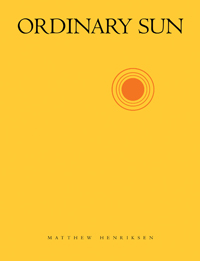Unfenced Existence; The Circuits of the Negative; and, What Is Grace?
by Matthew Henriksen
Black Ocean, 2011
120 pages / $15 Buy from SPD
Matthew Henriksen’s book, a beautiful yellow with a lovely orange orb on the cover, is aptly named, and when I first read it, I thought: “Blake! William Blake!” And of course, I was not entirely wrong, for Blake’s vision, his sense of wanting the writer to be essentially Romantic, revolutionary and ultimately Christian (though in an idiosyncratic way) is part of this book’s ethos. But to assume that one poet—now just a name to many—can influence a complex and intricate book about waking and sleep, vision and its oblivious counterpart, is perhaps misguided. On rereading, I find echoes of the canon and what also is not included there; I find places where Henriksen’s guided eye finds a way to relish the negative, and I think of theory, just a little: the series of “short-circuits” that someone like Slavoj Žižek would want us to find in something like a parallax view, the view “from both sides” of a picture or a noetic gap. This is what I think Henriksen is doing, ultimately, and I relish the intricacies of such poems that wonder with presence and absence inextricably connected by the beauty of the images that Henriksen employs. “What is love but a negative collaboration?” (“Afterlife Ending as a Question”).
October 7th, 2011 / 12:00 pm
Matthew Henriksen’s Ordinary Sun
“The great painter Degas often repeated to me a very true and simple remark by Mallarmé. . . . One day he said to Mallarmé: ‘Yours is a hellish craft. I can’t manage to say what I want, and yet I’m full of ideas. . . .’ And Mallarmé answered: ‘My dear Degas, one does not make poetry with ideas, but with words’.”
Paul Valéry in “Poetry and Abstract Thought” from The Art of Poetry, which is an essay I was supposed to read in college but didn’t. It’s good though, and Valéry is using this anecdote on the way to illustrating a distinction between poetry and “purposive language” such that the latter is akin to walking to a destination while poetry, by contrast, is dancing.
I’m reading Valéry now as fodder for a conversation I’m having with my mom, in which I hope to justify Matthew Henriksen’s abstruse but beautiful book, Ordinary Sun, out now from Black Ocean. It was a valuable challenge to have Mom read these poems to me because her disinterestedness problematized the book. She’s not willing to see the poems as incommunicative but lovely because she is only interested in this “purposive language.”
 I emailed her and argued that clearly Henriksen cares about what he’s writing, “so these poems are a good place to start exploring the ineffable. Language — words on their own, without communicative meaning — is one of the essential things about being human,” and she agreed, saying that “yes, words ARE one of the essential things of being human, but it is so they do make sense/meaning with each other, in contrast to nonsense.” So take that, Henriksen. I don’t think my mom likes your book.
I emailed her and argued that clearly Henriksen cares about what he’s writing, “so these poems are a good place to start exploring the ineffable. Language — words on their own, without communicative meaning — is one of the essential things about being human,” and she agreed, saying that “yes, words ARE one of the essential things of being human, but it is so they do make sense/meaning with each other, in contrast to nonsense.” So take that, Henriksen. I don’t think my mom likes your book.
April 27th, 2011 / 10:49 am
new issue: Harp & Altar #5

Poetry by Stephanie Anderson, Jessica Baron, Julia Cohen, Claire Donato, Elizabeth Sanger, Peter Jay Shippy, and G.C. Waldrep; prose by Joshua Cohen, Evelyn Hampton, Lily Hoang, Peter Markus, and Bryson Newhart; Patrick Morrissey on John Taggart and Matthew Henriksen on Anywhere; Michael Newton’s gallery reviews; and artwork by A.L. Steiner + robbinschilds.
“There are apologies I am too” by Claire Donato (complete poem)
The night you leave, I write tourist across my stomach with regard
to everything I’ve ever done. Later, I read cities could conserve by
shutting off their lights. There are apologies I am too
close to understand. How I pass my days? Try to go to sleep. No
room can numb someone with blue across her back.
Or, replace everything that’s lost. You have to pass the time.

December 19th, 2008 / 11:27 am

